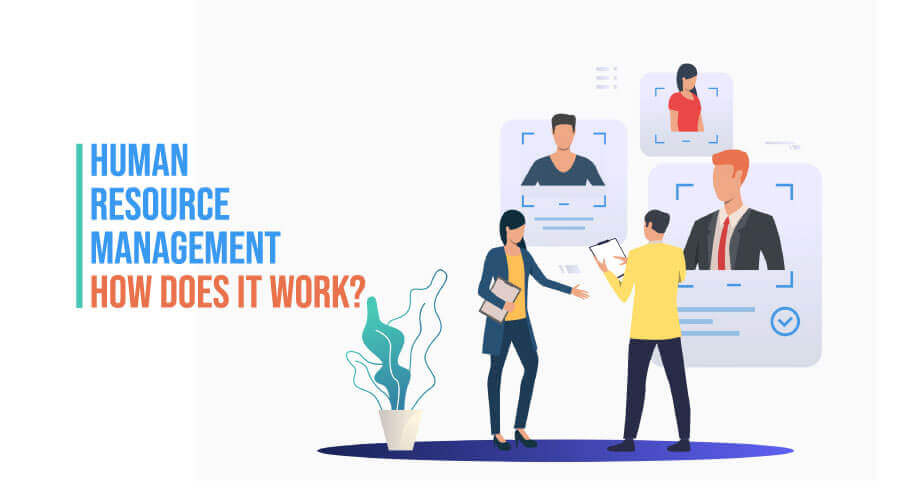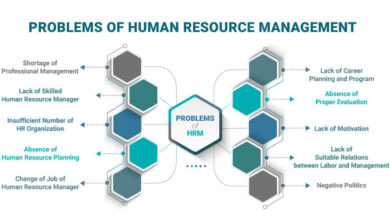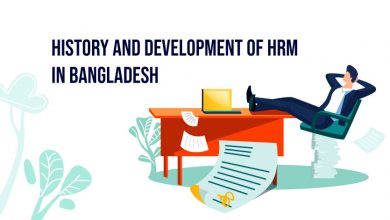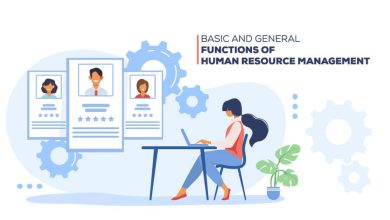What Is Human Resource Management (HRM)? How Does It Work?
The process of managing individuals within a company is known as human resource management. HRM includes activities such as hiring, firing, training, and developing employees. The goal of HRM is to ensure that the right number of people with the right skills are in the right places at the right times to achieve the organization’s goals.
History of Human Resource Management
The modern field of human resources began to take shape in the early 20th century. However, it was not until the aftermath of World War II and the great depression that HR truly came into its own. In 1910, amid a period of labor unrest and social upheaval, David Dubin published the first-ever book on the topic of HR. The following decade saw the passage of Title VII of the Civil Rights Act, which brought the fight for civil rights to the workplace.
As the baby boomers came of age in the 1960s, they began to push for increased rights and opportunities in the workplace. This led to clashes with older generations who were more comfortable with the status quo. At the same time, technology was rapidly evolving, forcing HR to adapt just to keep up. In 1980, global trade and communication exploded with the advent of the personal computer. Suddenly, companies had to compete with businesses all over the world, and the role of HR shifted from simply managing payroll and benefits to managing an organization’s entire workforce.
However, if you want to know details about it, you should read the two articles one is A Brief History of Human Resource Management and another is Evolution and Development of HRM in Bangladesh.
What is Human Resource Management?
HRM provides a suite of services designed to help companies make more informed decisions about how to allocate their resources. These services include:
- Business Process Optimization – This service analyzes a company’s current processes and recommends improvements based on data collected from its employees.
- Human Capital Analytics – This service uses AI to analyze employee performance and identify areas where improvement is needed.
- Performance Management – This service allows managers to track and measure the performance of individual employees.
- Talent Acquisition & Retention – This service helps companies recruit and retain top talent by providing them with insights into what makes people successful at work.
Definitions of Human Resource Management
Human Resource Management has defined as a process of acquisition, development, motivation, maintenance, and utilization of manpower in an organization for purpose of achieving predetermined goals. Human Resource Management is related to a few aspects of Human Resources working in the organization.
Human Resource Management has been defined in many ways by different authors. These definitions are given below.
Human Resource Management is the set of organizational activities directed at attracting, developing and maintaining an effective work force. Ricky W. Griffin
The policies and practices involved in carrying out the people of human resource aspects of a management position including recruiting, screening, training, rewarding and apprising. Gray Dessler
Human Resource Management is a series of decisions that affect the relationship between employees and employers; it affects m
any constituencies and is intended to influence the effectiveness of employees and employers. George T. Milkovich, and John W. Boudreau
Human Resource Management is the provision of leadership and direction of people in their working or employment relationship. Dake Yoder
Human Resource Management many be defined as a set of activities which include acquisitions, development, motivation, maintenance and utilization of manpower for the purpose of effective and timely achievement of organizational goal/s. M. Ataur Rahman
Human Resource Management is the use of Human Resources in an organization through the management of people related activities. John H. Jackson, Robert L Mathis, and Sean R. Valentine
Human Resource Management is comprised of the staffing, development, motivation and maintenance functions. Each of these functions however is affected by external influences. David A. DeCenzo and Stephen P. Robbins
From the above discussion, we can say that Human Resource Management is the set of activities relating to procuring, developing, maintaining, and utilizing a group of people for the proper function of organizational activities and achievement of goals.
Characteristics of HRM
- Development of well-conceived policy
- Development of harmonious relations
- Establishing a chain command
- Awareness of own nature of services
- Acquire full professional and operational knowledge
- Must be good communication and effective leader. Know to expand the characteristics of human resource management.
Principles of HRM
- Scientific selection
- Employee development
- Labor-management cooperation
- Free flow of commutation
- Principles of fair remuneration
- Incentive
- Dignity of labor
- Participation
- Contribution, and
- Team spirit. Get details on the Principles of Human Resource Management.
Functions of HRM or What is HRM?
There are two types of functions of HRM. One is the basic functions of HRM and another is the general functions of HRM. Such as-
Basic Functions of HRM
- Acquisition
- Development
- Motivation
- Maintenance
General Functions of HRM
- Formulation of Human Resource Policies
- Recruitment of skilled human resources
- Selection and posting of human resources
- Job analysis and description
- Promotion and transfer
- Orientation and socialization
- Training and development
- Career planning and development
- Job evaluation
- Performance appraisal
- Remuneration
- Providing benefits and incentives
- Handling grievances
- Maintaining discipline
- Worker’s participation
- Labor-management relations
- Reduction of dispute
- Managing trade unions
- Collective bargaining
- Maintenance of working environment
If you want to know the details of these basic and general functions with practical examples. You can read the functions of human resource management article.

Phases of HRM
- Pre-Hiring Phase: Human resource planning and job analysis.
- Hiring Phase: Staffing involvement in policies and procedures through recruiting and selecting employees.
- Post-Hiring Phase: Getting expertness through training and development to gain effective results in the current and the future job span.
These phases are very effective to install HRM successfully in an organization or business. So, you should learn it in detail. You can get it in detail from the effective Phases of Human Resource Management article.
Philosophy of Human Resource Management
Any organization’s essential principles for managing human resources come from its approach to people. Every firm has a philosophy, even though it is not documented. It offers guidance on personnel policies. There are two opposing perspectives on employees at work.
- Technical Factor: The technical element of the production is considered to be labor.
They are handled like a commodity and are exchangeable. - Human Factor: The human element of labor has been seen as having several potential advantages.
Therefore, they need to be treated with decency and respect.
Importance of HRM
- Policy formulation
- Policy execution
- Review of employee needs
- Utilization of human resources
- Social welfare
- Effective trade unionism
- Overall development of the organization
Objectives of HRM
- To select skilled employees
- To develop efficiency and skills of employees
- To ensure effective performance of employees
- To change employee behavior
- To train subordinates
- To increase job satisfaction
- To attract good people
- To ensure discipline
- To coordinate among different functions, and
- To develop working conditions. Read more about the Objectives of Human Resource Management.
Human Resource Management Models
- Human Resource Planning
- Recruitment and Selection
- Promotion and Transfer
- Job Design and Analysis
- Training and Development
- Job Evaluation
- Rewards and Benefits
- Merit Rating
- Career Development
- Grievance Handling
- Disciplinary Action
- Disciplinary Action
- Employee Service or Welfare
- Communication
- Human Resource Costing and Audit
- Labor Relations
Means to Success of HRM
- Proper policy
- Acceptability of policies
- Capability
- Top management support
- Trade union support
- Impartiality
Factors Determining the Efficiency of HRM
- Total labor productivity
- Presence of efficient employees
- Nature of labor-management relations
- Frequency of labor turnover
- Rate absenteeism
- Volume of training
- Utilization of human resources
- Efforts for employee services
Problems of HRM
Human resource management faces a lot of problems. These problems can be classified into many types. These are mentioned below-
- Shortage of professional management
- Lack of skilled human resource manager
- Insufficient number of the HR organization
- Absence of human resource planning
- Change of job of the human resource manager
- Lack of career planning and program
- Absence of proper evaluation
- Lack of motivation
- Lack of suitable relations between labor and management
- Negative politics
Means to Overcome the Problems of HRM
The following measures may be effective to solve the problems of HRM. If all these measures are taken carefully, we hope problems may be solved successfully.
- Effective human resource planning
- Proper establishment
- Long-time job as a human resource manager
- Possibility of career planning and program
- Positive relations between labor and management
- Proper job evaluation
- High professional management
- The ability of a skilled human resource manager
- Proper human resource motivation
- Positive working conditions.
In problems of human resource management are manifold. So, multidimensional measures can be used to solve the problems. Business and industrial organizations must afford these measures.
How Does Human Resource Management Work?
Human Resource Management works by analyzing data from an organization’s workforce. Using this data, the system identifies trends and patterns that can then be used to improve business operations.
Why Should You Try Human Resource Management?
Businesses often struggle with how to effectively use their human capital. This is especially true when it comes to managing employees who work remotely. Remote workers are more likely to leave jobs than those who work in the office, so companies need to make sure they’re doing everything possible to retain them.



